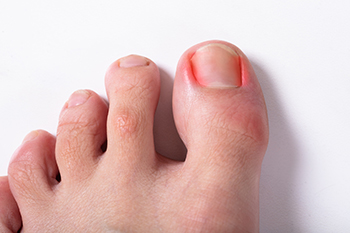Items filtered by date: April 2024
Minimizing Fall-Related Foot Injuries

When facing a fall with foot injuries, adopting specific techniques can minimize the risk of worsening existing conditions or sustaining further harm. Leaning into the fall can help distribute impact and reduce strain on the feet and ankles. Falling to the side instead of forward or backward can protect the toes from direct trauma. Keeping the knees bent upon impact can absorb shock and prevent excessive strain on the lower limbs. In cases of foot injuries resulting from falls, it is suggested you consult a podiatrist for comprehensive evaluation and treatment. Podiatrists possess specialized knowledge in diagnosing and managing foot and ankle injuries. They can assess the extent of damage, and recommend appropriate interventions such as braces, orthotics, or even surgical procedures if necessary.
Preventing falls among the elderly is very important. If you are older and have fallen or fear that you are prone to falling, consult with one of our podiatrists from New Tampa Foot & Ankle. Our doctors will assess your condition and provide you with quality advice and care.
Every 11 seconds, an elderly American is being treated in an emergency room for a fall related injury. Falls are the leading cause of head and hip injuries for those 65 and older. Due to decreases in strength, balance, senses, and lack of awareness, elderly persons are very susceptible to falling. Thankfully, there are a number of things older persons can do to prevent falls.
How to Prevent Falls
Some effective methods that older persons can do to prevent falls include:
- Enrolling in strength and balance exercise program to increase balance and strength
- Periodically having your sight and hearing checked
- Discuss any medications you have with a doctor to see if it increases the risk of falling
- Clearing the house of falling hazards and installing devices like grab bars and railings
- Utilizing a walker or cane
- Wearing shoes that provide good support and cushioning
- Talking to family members about falling and increasing awareness
Falling can be a traumatic and embarrassing experience for elderly persons; this can make them less willing to leave the house, and less willing to talk to someone about their fears of falling. Doing such things, however, will increase the likelihood of tripping or losing one’s balance. Knowing the causes of falling and how to prevent them is the best way to mitigate the risk of serious injury.
If you have any questions, please feel free to contact our office located in Wesley Chapel, FL . We offer the newest diagnostic and treatment technologies for all your foot care needs.
Are Bunions Affecting Your Everyday Life?
Are Bunions Affecting Your Everyday Life?
Ingrown Toenail Management

Ingrown toenails occur when the edge of the toenail grows into the surrounding skin, leading to pain, redness, and potential infection. Causes include improper nail trimming, tight footwear, injury, or genetic predisposition. To prevent ingrown toenails, it is important to cut nails straight across and avoid rounding the edges. Wearing properly fitted shoes that allow for ample toe room can also reduce the risk. Allowing toenails to breathe by wearing open-toed shoes occasionally promotes healthy nail growth and reduces pressure on the toes. If you have an ingrown toenail and the pain worsens or it appears infected, it is suggested that you seek prompt treatment from a podiatrist. This foot doctor can provide professional care, such as lifting the nail edge, prescribing antibiotics for infection, or performing a partial nail avulsion procedure if necessary.
Ingrown toenails can become painful if they are not treated properly. For more information about ingrown toenails, contact one of our podiatrists of New Tampa Foot & Ankle. Our doctors can provide the care you need to keep you pain-free and on your feet.
Ingrown Toenails
Ingrown toenails occur when a toenail grows sideways into the bed of the nail, causing pain, swelling, and possibly infection.
Causes
- Bacterial infections
- Improper nail cutting such as cutting it too short or not straight across
- Trauma to the toe, such as stubbing, which causes the nail to grow back irregularly
- Ill-fitting shoes that bunch the toes too close together
- Genetic predisposition
Prevention
Because ingrown toenails are not something found outside of shoe-wearing cultures, going barefoot as often as possible will decrease the likeliness of developing ingrown toenails. Wearing proper fitting shoes and using proper cutting techniques will also help decrease your risk of developing ingrown toenails.
Treatment
Ingrown toenails are a very treatable foot condition. In minor cases, soaking the affected area in salt or antibacterial soaps will not only help with the ingrown nail itself, but also help prevent any infections from occurring. In more severe cases, surgery is an option. In either case, speaking to your podiatrist about this condition will help you get a better understanding of specific treatment options that are right for you.
If you have any questions please feel free to contact our office located in Wesley Chapel, FL . We offer the newest diagnostic and treatment technologies for all your foot and ankle needs.
Ingrown Toenail Management

Ingrown toenails occur when the edge of the toenail grows into the surrounding skin, leading to pain, redness, and potential infection. Causes include improper nail trimming, tight footwear, injury, or genetic predisposition. To prevent ingrown toenails, it is important to cut nails straight across and avoid rounding the edges. Wearing properly fitted shoes that allow for ample toe room can also reduce the risk. Allowing toenails to breathe by wearing open-toed shoes occasionally promotes healthy nail growth and reduces pressure on the toes. If you have an ingrown toenail and the pain worsens or it appears infected, it is suggested that you seek prompt treatment from a podiatrist. This foot doctor can provide professional care, such as lifting the nail edge, prescribing antibiotics for infection, or performing a partial nail avulsion procedure if necessary.
Ingrown toenails can become painful if they are not treated properly. For more information about ingrown toenails, contact one of our podiatrists of New Tampa Foot & Ankle. Our doctors can provide the care you need to keep you pain-free and on your feet.
Ingrown Toenails
Ingrown toenails occur when a toenail grows sideways into the bed of the nail, causing pain, swelling, and possibly infection.
Causes
- Bacterial infections
- Improper nail cutting such as cutting it too short or not straight across
- Trauma to the toe, such as stubbing, which causes the nail to grow back irregularly
- Ill-fitting shoes that bunch the toes too close together
- Genetic predisposition
Prevention
Because ingrown toenails are not something found outside of shoe-wearing cultures, going barefoot as often as possible will decrease the likeliness of developing ingrown toenails. Wearing proper fitting shoes and using proper cutting techniques will also help decrease your risk of developing ingrown toenails.
Treatment
Ingrown toenails are a very treatable foot condition. In minor cases, soaking the affected area in salt or antibacterial soaps will not only help with the ingrown nail itself, but also help prevent any infections from occurring. In more severe cases, surgery is an option. In either case, speaking to your podiatrist about this condition will help you get a better understanding of specific treatment options that are right for you.
If you have any questions please feel free to contact our office located in Wesley Chapel, FL . We offer the newest diagnostic and treatment technologies for all your foot and ankle needs.

